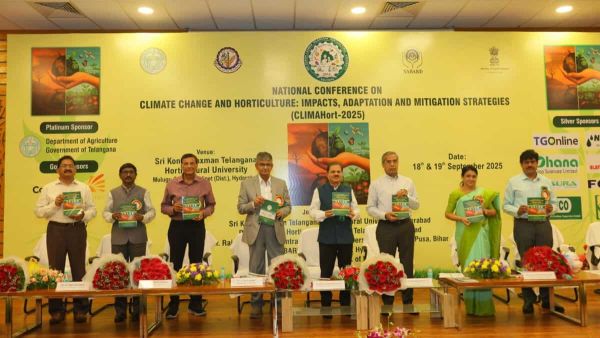
Hyderabad: Director General of the India Meteorological Department Dr Mrityunjaya Mahapatra said that the current weather forecasts are accurate only by 40 to 50 per cent, and it would improve with multi-forecast models in the near future.
He said that climate change was not just adversely impacting the farmers and other sections, but has also been posing challenges to the meteorological department, which has been adopting appropriate strategies to address it.
He was addressing the inaugural session of the two-day “National Conference on the Impact of Climate Change on Horticulture: Impacts, Adaptation and Mitigation Strategies,” jointly organised by Sri Konda Laxman Telangana Horticultural University (SKLTGHU), Department of Horticulture, NABARD, Dr Rajendra Prasad Central Agricultural University, and the Union Ministry of Earth Sciences at SKLTGHU in Mulugu on Thursday, September 18.
“Only by collectively adopting mitigation strategies, the impending adverse impact of climate change on humans, agriculture and horticulture sectors could be reduced,” he said, stressing that all efforts needed to be focused on the impact of climate change, especially on the small and marginal farmers.
He said that there is a need to provide innovative solutions to small and marginal farmers living in the remote areas, to withstand the impact of these changes, and also to disseminate information related to environmental changes and climate to all from time to time.
He said that changes in cultivation, appropriate policies, and crop selection were needed in accordance with the changing climate that is currently visible.
Suggesting that crops needed to be cultivated using global action and local production methods, He felt research should be intensified towards crop varieties that could withstand climate change, give high quality and good yields.
Speaking on the occasion, Telangana agriculture secretary and agricultural production commissioner M Raghunandan Rao said that all the research done and policies formulated till now have been to ensure food security for the country, and now it is time for all to work for the nutritional security of the country, for which appropriate policies need to be formulated.
Observing that climate change is an obstacle to this goal, he felt that the meteorological department, technical experts and scientists needed to work together to achieve it.
SKLTGHU vice-chancellor Dr Danda Rajireddy said that the university and it’s research wings were ready to provide all possible technical and research-based solutions to the farmers, to reduce the impact of climate change on the horticultural sector.
He assured that the state government, the horticulture department and the university will work together to help the farmers overcome the impact of climate change.
A book on “Introductory Agricultural Meteorology” and a book of abstracts prepared by experts were released at the conclave.